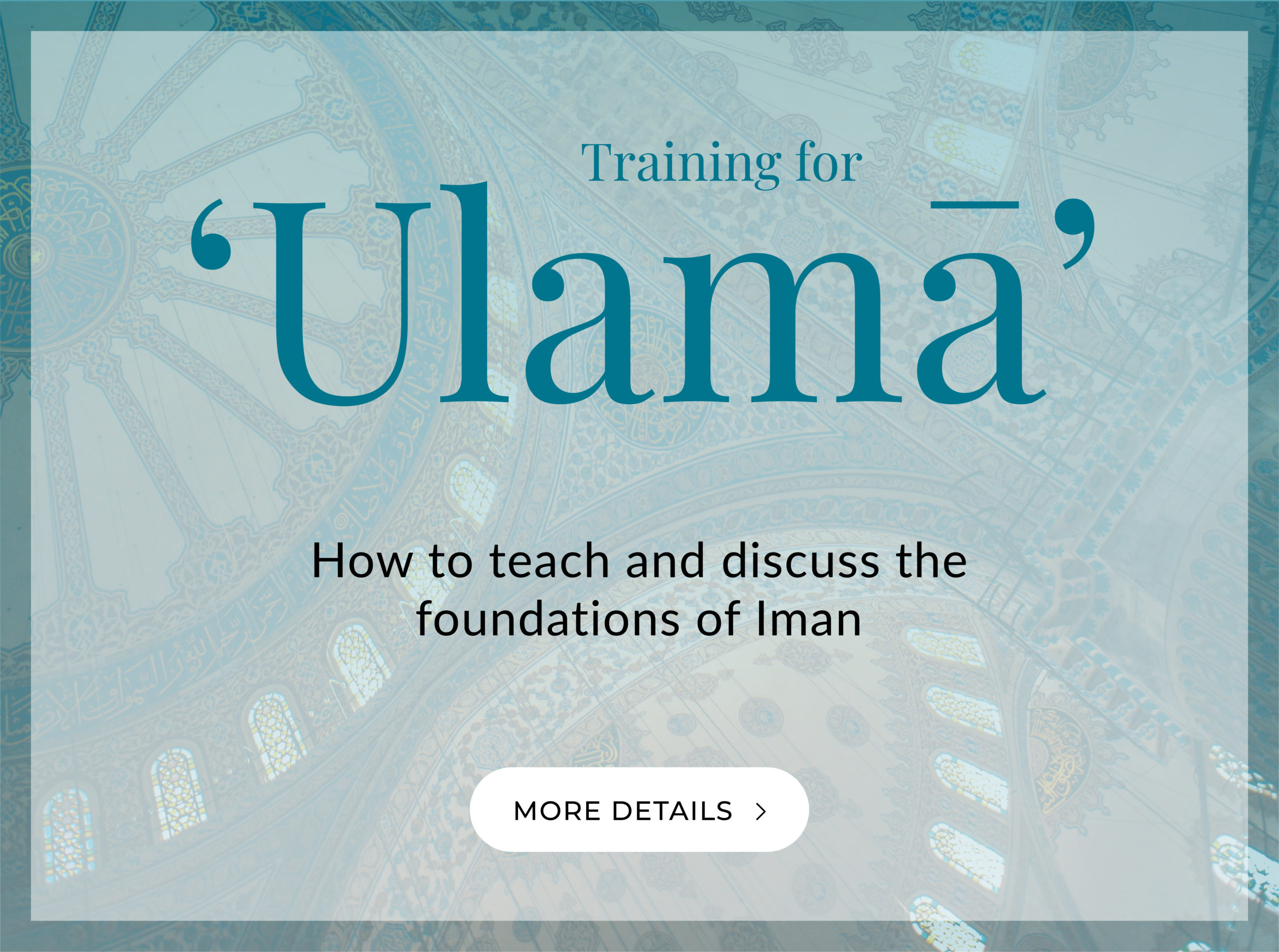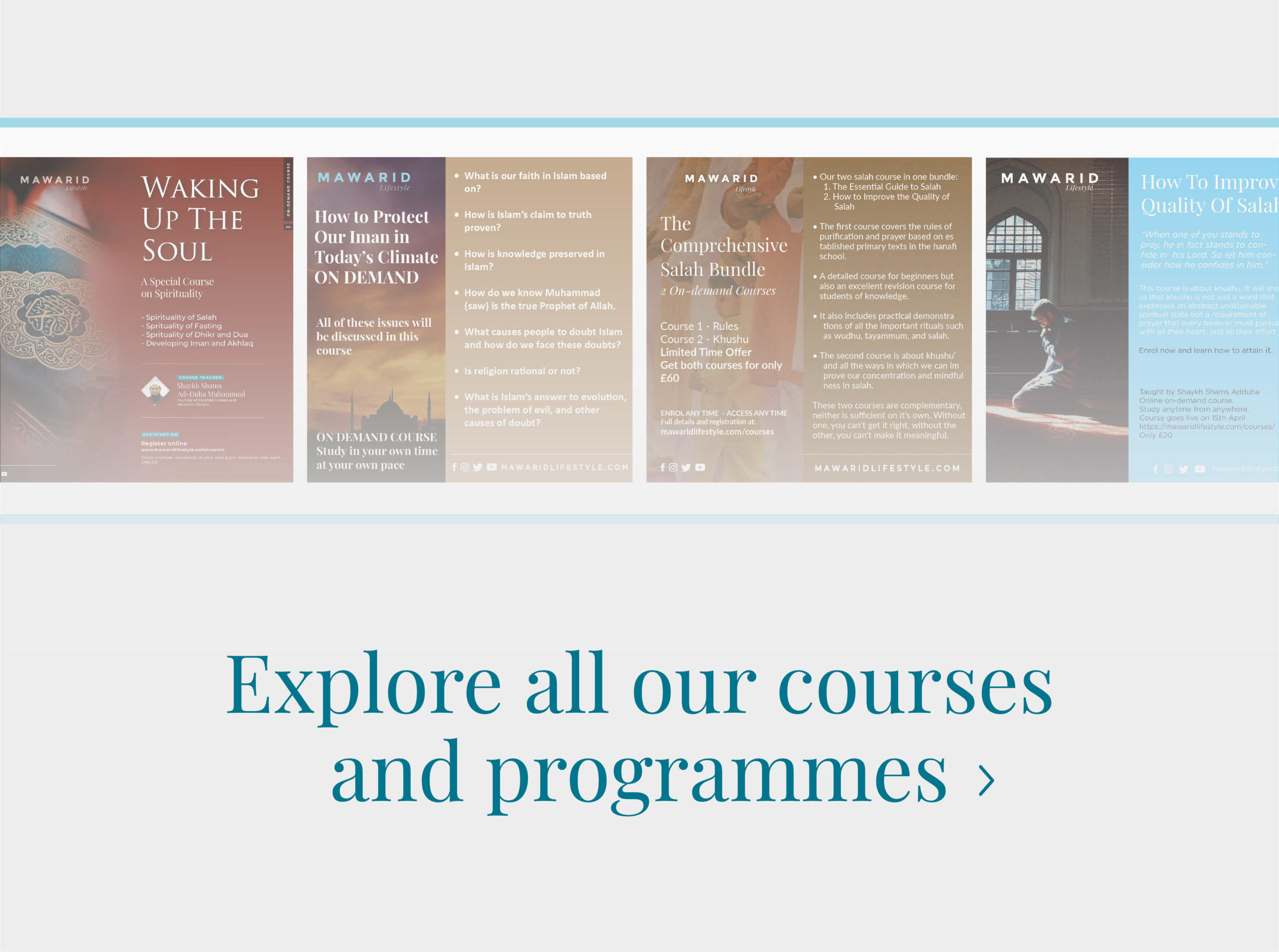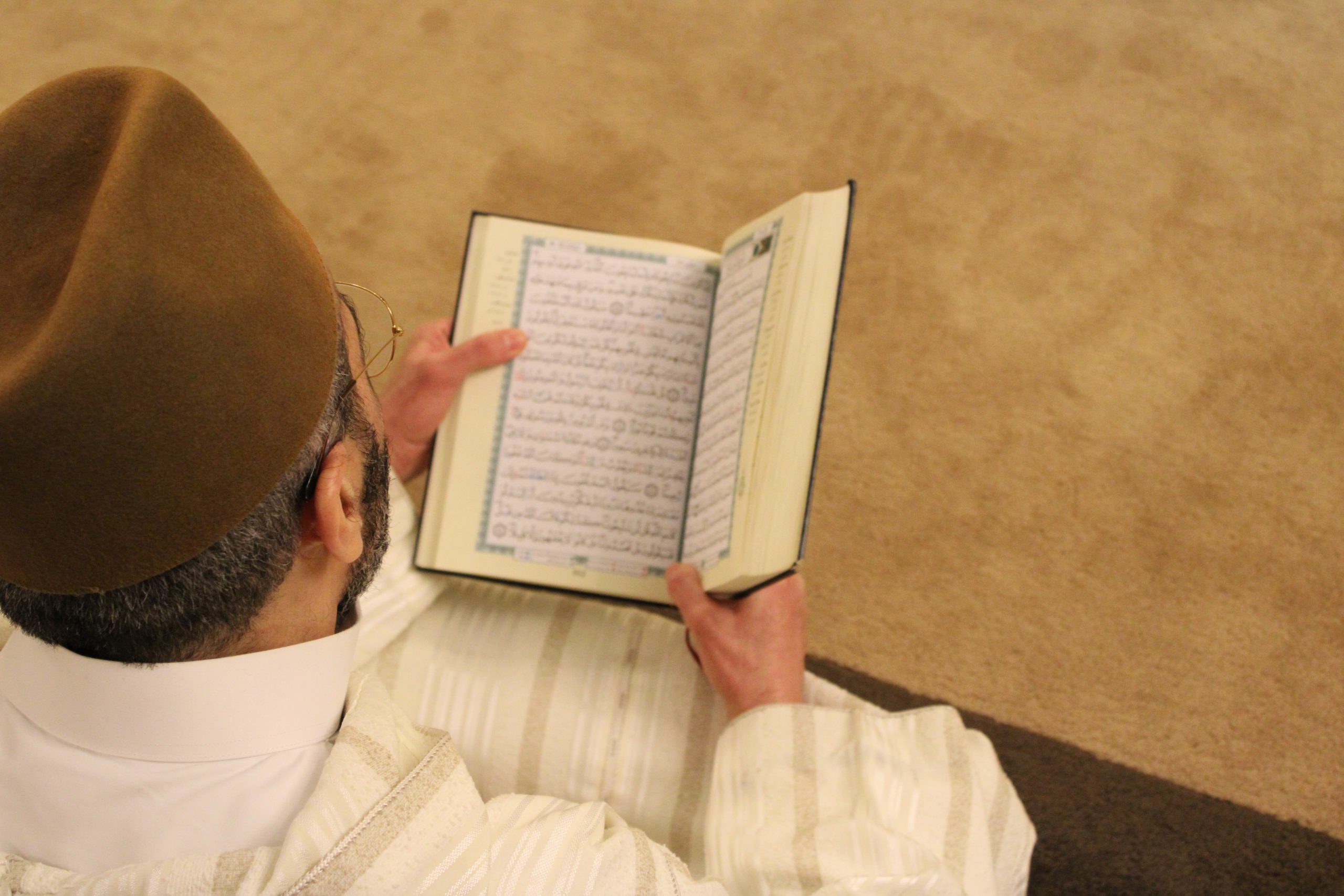During the blessed days of Ramadhan, we are all looking for the best ways to spend our time. Those servants of Allah (Exalted is He) who He has blessed with a commitment to spending more time in worship will be seeking out different modes of worship to fill their days with.
With the Covid 19 crisis, many people also have time on their hands. People who are working from home are saving on the time normally spent commuting, taking lunch breaks etc. Furthermore, the only way to get through this crisis, whether we survive it or not – Allah (Exalted is He) keep us in His ‘aafiyah’ – is to turn to Allah (Exalted is He) with tawbah (sincere repentance), abstention from sin, and increased worship.
While recording the Mawarid Lifestyle course called, ‘How To Improve Quality of Salah’, I discussed how nawafil (optional salahs) play a major role in improving the quality of our salah overall. Nawafil, including sunnah prayers, prepare us for our fardh, and optional prayers like tarawih and tahajjud give us a different experience of salah: of heightened khushu’ (devotion, humility, emotion and concentration) that is different to the experience of fardh salah which is surrounded by daily life and distractions. We can then try to recreate that experience in fardh prayers and work to make that experience of khushu’ the norm.
Salah is the greatest form of worship. It is the greatest gift of Allah (Exalted is He) to this ummah given to the Prophet (peace be upon him) in person in the heavens during the mi’raj. It is five prayers, in place of 50. It is the pillar of the religion, a communion with Allah (Exalted is He), the difference between Islam and kufr in a person, a five times washing of sins, and the first action to be judged on the day of judgement. Because of the status of fardh prayer as the greatest obligatory deed, nafl salah also takes the position of being the greatest optional deed. We need to take advantage of this treasure in Ramadhan, use nawafil to raise the quality of our salah, and create some new habits and carry them on after Ramadhan.
So, while recording this course, I decided to include a brief overview of all of the most common nawafil of the day so that students would know where the opportunities for extra reward are in their daily lives. I thought I would extend that with this post, which is a more detailed breakdown, with hadiths of virtue supporting each salah. I am writing this post to share them with you. Please take advantage of them in Ramadhan and beyond.
The following are the most common nawafil of the day based on the Hanafi madhhab. To my knowledge, they all apply in the other schools with some minor differences, such as regarding the four sunan before Jumu’ah and the two rak’ahs before Maghrib. The emphasis of some of the prayers mentioned below differs in the different schools from a fiqh (juristic) point of view, but they are all encouraged and all carry immense reward in all the schools as shown by the hadiths cited.
1. Sunnah Mu’akkadah (Those The Prophet Persisted On And Rarely Missed) That Are Before Or After Fardh Prayers
“Allah will build a house in Paradise for a person who persists in performing twelve rak’ahs of prayers during the day and night: four rak’ahs before Dhuhr and two rak’ahs after it, two rak’ahs after Maghrib, two rak’ahs after Isha, and two rak’ahs before Fajr.”
Four Rak’ahs before (in the Hanafi and Shaf’i madhhabs) and after Jumu’ah (in all schools) are also sunnah mu’akkadah. Some scholars recommend a further two after Jumu’ah.
All of these, classed as sunnah mu’akkadah, are important and shouldn’t be missed at any time without a reason. In Ramadhan, there shouldn’t be any excuse for anyone.
2. Sunnah Ghair Mu’akkadah or Nafl Before Or After Fardh Prayers
a. Two Rak’ahs After Dhuhr
The Prophet (peace be upon him) said,
‘Whoever prays four rak’ahs before Dhuhr and four after, the fire will not touch him.’ (al-Nasa’i)
b. Four Rak’ahs Before Asr
The Prophet (peace be upon him) is reported to have said, ‘Allah have mercy on a slave who prays four rak’ahs before Asr. (Abu Dawud)
c. Six Rak’ahs After Maghrib (also Known As Awwabeen)
These can also be classed as a separate nafl salah. However, they are included here as most fiqh books in the Hanafi madhab mention them with Maghrib.
An unspecified number of extra nawafil are also recommended after Maghrib from a minimum of two upwards. Some hadiths recommend six specifically.
Hudhaifah (ra) said, ‘I came to the Prophet (peace be upon him) and prayed Maghrib with him. He prayed until ‘Isha.’ (al-Nasa’i)
The Prophet (peace be upon him) said, ‘Whoever prayed six rak’ahs between Maghrib and ‘Isha, twelve years of worship are written for him.’ (al-Tirmidhi)
Note: Two Rak’ahs are mustahabb between the adhan and iqamah according to some schools. Some Hanafi scholars also say it is permitted, especially when at a masjid where there is time to pray them between the adhan and iqamah.
d. Two Or Four Rak’ahs Are Mustahabb Before Isha
There isn’t a specific hadith on this hence it is classed as mustahabb (recommended). A general recommendation for two rak’ahs would come from the hadith, ‘Between every two adhans (adhan and iqamah) there is a salah.” (al-Bukhari) Imam Abu Hanifah preferred nawafil to be performed in fours hence the common practise among hanafis of praying four before ‘Isha. However, two is also correct.
e. Two Or Four Rak’ahs after Isha
‘Aisha (ra) said, ‘The Messenger of Allah (peace be upon him) never came to me after having prayed Isha except that he performed four rak’ahs or six rak’ahs. (this includes the sunnah mu’akkadah. Excluding them it is two or four) (Abu Dawud)
3. Tahajjud/Qiyam Al-Layl: Best Performed In The Last Third Of The Night After Sleeping – 2-8 Rak’ahs
The Prophet (peace be upon him) said,
“Hold on to the night prayer because it is the practice of the righteous slaves before you, a means of drawing near to your Lord, an expiation of sins, and it prevents one from committing sins.” (al-Tirmidhi).
“The best prayer after fardh is the night prayer.” (Muslim)
4. Duha Prayer – 2 Rak’ahs Or More Between Sunrise And Just Before Noon
The Prophet (peace be upon him) said,
“In the morning, every single joint of yours must pay a sadaqah (charity). Every SubhanAllah is a sadaqah, every Alhamdulillāh is a sadaqah, every La Ilaha Illa Allah is a sadaqah, every Allahu Akbar is a sadaqah, every [act of] commanding good is a sadaqah, and every [act of] forbidding evil is a sadaqah, and all this is sufficed by two rakʿahs of duha.” (Muslim)
The Prophet (peace be upon him) said, “Whoever consistently performs two rak’ahs of duha, their sins are forgiven, even if like the foam of the sea.” (Ibn Maja and Tirmidhi)
5. Special Early Duha Or Ishraq Prayer
The Prophet ﷺ said: “Whoever prays the Fajr prayer then sits in his place of prayer remembering Allah until sunrise, then prays two rakʿahs, shall be rewarded as if he had performed Hajj and ʿUmrah, with a reward that is complete, complete, complete.” (al-Tirmidhi)
6. Tahiyyatul Masjid: Two Rak’ahs Upon Entering The Masjid Before Sitting Down If There Is Time Before The Fardh And Sunnah Mu’akkadah
This is excluding Masjidul Haram where one should proceed to tawaf.
The Prophet (peace be upon him) said,
“When one of you enters a masjid, do not sit down before praying two rak’ahs.” (Agreed upon)
7. Tayiyyatul Wudhu: Two Rak’ahs After Wudhu Before The Water Dries
The Prophet (peace be upon him) said,
“Whoever does wudhu like this wudhu of mine and then performs two rak’ahs in which he does not speak to himself, all of his past sins are forgiven.” (Muslim)
8. Salatul Hajah (The Prayer Of Need)
The Prophet (peace be upon him) said,
‘Whoever does wudhu and does it well, then prays two rak’ahs perfecting them, Allah will grant him whatever he asks either sooner or later.’ (Ahmad)
May Allah give us all the tawfeeq to draw close to him through nawafil.
Praying Salah With Khushu’ Is Obligatory
Take our course on khushu’ to learn it.






